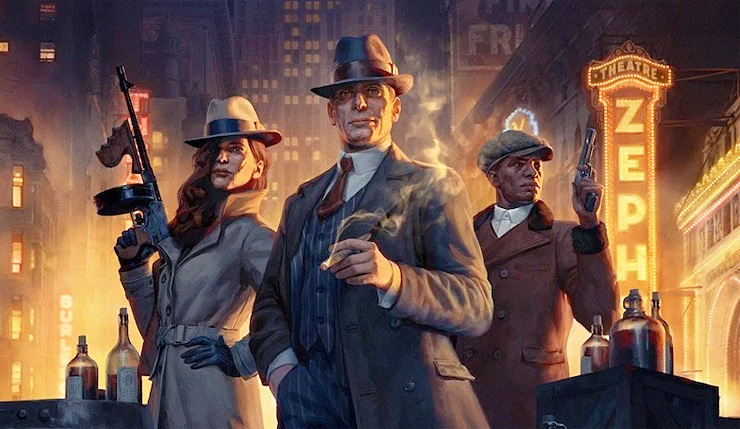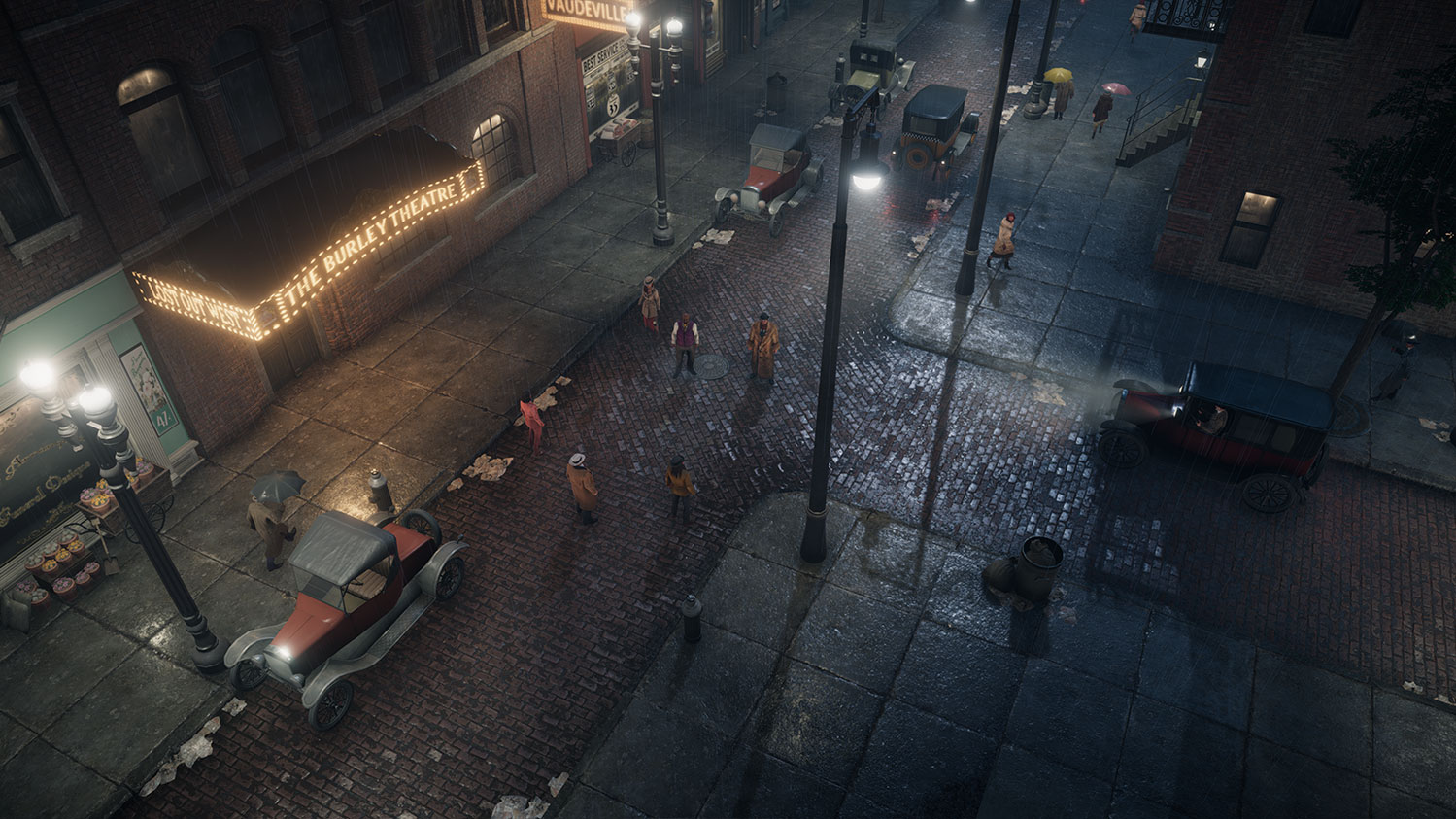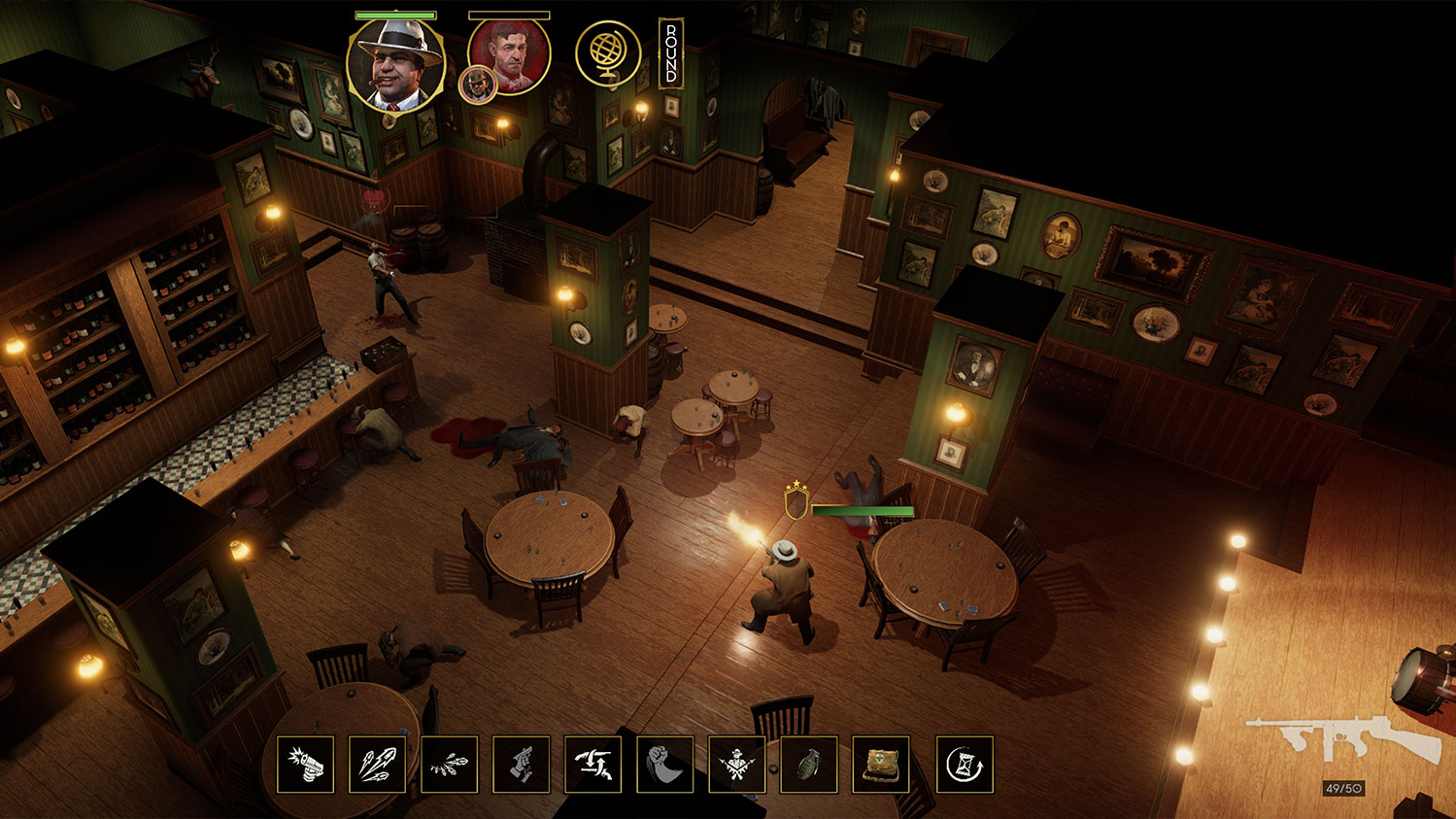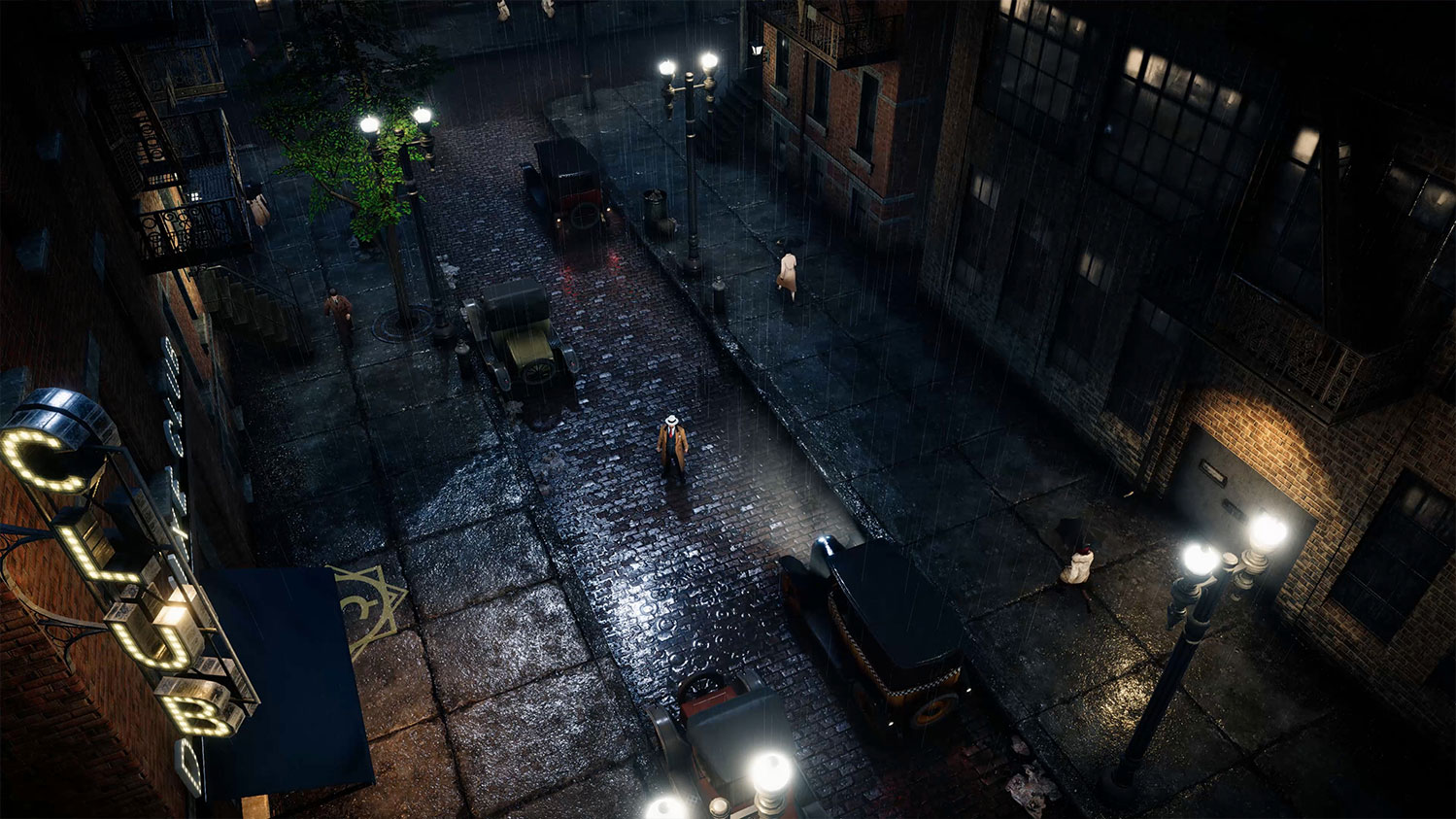At PDXCON 2019 in Berlin, I had the chance to sit down with John Romero (of DOOM/id Software fame) to talk about his and his wife Brenda Romero’s new game. Developed by Romero Games, Empire of Sin is a criminal empire management RPG strategy game set in Chicago during the 1920s prohibition era. Players choose from more than 10 crime bosses to rule the streets of Chicago, taking down other empires and building their own. It melds management-style simulation games with turn-based strategy to bring out a character-focused experience that’s bound to be different every time you play through.
Empire of Sin is a game that Brenda Romero has been wanting to make for more than 20 years. While obviously a work of fiction, it pulls from real people, places, and events in history. John was sure to reiterate that game is Brenda’s design, and anything that he does with it is in the confines of her vision. An immense amount of historical research has gone into making sure that the game retains an accuracy to the period. Over the course of the Empire of Sin’s timeline, players will even find themselves faced with specific events that happened at specific times in history, “if they can survive that long.”
“There’s a lot of things that happened every single day that aren’t written in the history books, right?” Romero told me as we talked about their research. Those moment to moment things are going into the missions and events that they are creating in this game. It’s aiming to give a more granular view of what that particular era of criminal empires may have been like. Of course, artistic liberties are being taken. Being confined to Chicago, there are certain bosses and gangsters being brought in from other regions around the world, as well as fictional characters created based on ideas from the era. Empire of Sin is the ultimate clash of early 1900s crime and culture.
Each of the bosses and characters will have different skills and abilities that should make them feel unique, increasing the replay value of choosing different bosses to try and rule the empire with. “We brought in a boss that was an entertainer. That’s Goldie. That’s how flapper girls danced and dressed back then,” Romero said, describing one of the fictional bosses based more on culture than a real individual. Goldie shares Brenda’s former last name as well, so the Romeros are also putting something of themselves into this game. In fact, the entire idea comes from Brenda’s upbringing in Ogdensburg, New York, where a bar called The Place is was once at the center of smuggling alcohol from across the border in Canada.
As much as Empire of Sin is about history, it is also a game that wants to tell character stories. Every one of the bosses and gangsters will have their own backstories and unique missions. (There are 60 gangsters and 14 bosses, meaning there are a few reasons to replay.) Between an emergent narrative being told by randomized traits and relationships with the gangsters you can hire, and the scripted character stories and missions that fill the game, every playthrough is bound to be unique. But it wasn’t easy to get that balance right. “When we started putting it in, we turned it on so it would happen fast. It became like this insane soap opera,” Romero told me about implementing the complex interactions. “All the characters were falling in love with each other, these love triangles, and killing each other. All kinds of crazy stuff. So, ‘yes it works.’ We had to dial it back, and every time we added a new thing, we had to make sure it fit and worked with everything else so it didn’t turn into this insane fiasco.”
These complex interactions will be used in very interesting ways, more than just creating murderous love triangles. “People want to weaponize STDs. You can kill somebody with STDs if they don’t go to a doctor soon enough. And they’ll spread STDs too. So someone can fall in love with somebody with STDs, they can give it to that person. If they don’t go to a doctor they can give it to somebody else and then they die. So it’s all kinds of [pause] fun.” Yup, that’s right. You’ll be able to take advantage of STDs to create an infectious Romeo and Juliet-like tragedy among the gangsters you hire.
Various event chains and dialog trees will also shape players’ playthroughs. “The event chains can trigger off all kinds of different things: time, things that happen in the game, statuses of things; a whole bunch of variables that at some point turn into a decision that this event should now pop up,” Romero told me. “The events have decisions, and sometimes a decision will be highlighted because a gangster you have has an ability or something that makes a new choice available in the event chain.” Making any decision branches off to a separate path and some events may loop back into themselves or proceed wholly uniquely. “Sometimes there’s a story happening in an event chain, and you can’t get the whole story unless you replay and choose a different option, and learn more about it.”
Each boss also enters the world of Empire of Sin via a taxi ride with Sal. Through conversation with Sal, players can either get a leg up early on or make things a little more tough on themselves. Be warned though. Any early favors may come knocking for payback at a later point in the game. Other dialog chains will happen during sit-downs with the other bosses in the area, the outcomes of which can make or break your playthrough (I failed miserably in my hands-on demo thanks to being too antagonistic and provoking a fight I was not prepared for).
Romero also talked about extensive testing and making sure that each of the bosses stood out as unique. They wanted to give players a reason to play the game again, both from a gameplay perspective as well as the stories that are being told. It’s not only each of the bosses that will have their own specialized stories and abilities, but the gangsters-for-hire as well. One boss may take a much more hands-off approach to manipulating the criminal empire for their gain, while another may lean into abilities that benefit from them getting some blood on their hands in a more direct way. Of course, any boss can be played in any way, but their stats and abilities will provide distinct advantages for certain playstyles, as well as helping you understand how the AI will play them against you.
Built for Controller
Being a PlayStation owner (and site), I had to ask Romero about bringing the game to consoles, a platform that is too often overlooked in the strategy, sim, and management genres. If you’ve got a controller in hand, there’s no need to worry. “From day one, the controller had to be playable,” Romero said. “Which means it’s made for console.” Empire of Sin was designed from the ground up with consoles in mind. It will be the same game across all platforms, but Romero Games is utilizing a tool that allows them to easily swap between UI layouts and button configurations so that all development can be done in-house without sending it out to be ported.
The most difficult aspect can be translating controls that are often more easily handled via mouse and keyboard. “When we come up with a feature, there has to be a controller version of that feature,” Romero remarked. “Things like drag and highlighting to select groups- you’re not doing that on a controller. So you have to be able to do really smart grouping. But we’re also allowing those [functions] on the PC because they exist, so why not?” Console versions of the game will have a button to smart select anybody that is around you, and while the PC will have standard drag and highlight functionality, it will also have the smart grouping controls.
Empire of Sin’s core themes and design are the work of Brenda Romero, but I was curious what influences and experience John was bringing into the mix, and how his past portfolio of games was helping him make this one. “Audio. I’m doing the audio in this game,” he said, but don’t worry DOOM fans. That’s not all he’s got. “The blood. And the attitude. [Laughs] Tempered by how much Brenda wants to put in. If she wants it to be more extreme, then that’s what we do. Dial it up.”
However, Empire of Sin does aim to take a bit of a more serious tone than those familiar with Romero’s previous work may be familiar with. “I have a dark humor, but the game’s not about dark humor. So we have to dial back the dark humor.” That doesn’t mean absurd and funny elements are completely absent though. “There’s definitely some funny shit in there. It’s just not ALL of it.”
Partnering with Paradox
Brenda spent a year working on the pitch for Empire of Sin (after 20 years of conceptualizing the idea and finally deciding it was time to make it). They worked with an agency that knows game publisher inside and out, and it was unquestionably a Paradox game. “They said ‘there’s no reason to go to anybody else. That’s totally a Paradox game,'” Romero said. “‘They are going to want that game.'” Rest assured Paradox Interactive is the perfect publishing home for Empire of Sin. As strategy and simulation experts, it was basically a no-brainer to bring Romero Games into the fold. Romero told me that the Civilization series was a huge influence on Empire of Sin, as well as other RPGs.
Paradox also deals in games that are a little bit more experimental. Most of the developers and titles under the Paradox umbrella tend to explore variations on themes and genres that help each of their games stand out as unique and without equal. In Empire of Sin’s case, it’s the combination of the criminal empire management with RPG elements that bring out the character stories, as well as the grid turn-based strategy game where combat takes place. You’ll actually get to know and care about the gangsters in your enterprise which should make many decisions all the more difficult and interesting to make. I kept bringing up XCOM during the interview, because of the same emergent character stories that come from becoming attached to your soldiers. While it’s not a perfect comparison (because XCOM’s characters are given names and backstories by the player), I imagine that many of the feelings will be the same.
Aside from just providing a publisher for Empire of Sin, Paradox Interactive also brings a vast expertise with strategy and management games. “If we need any help, we just ask them ‘hey can we talk to somebody about something?’ and they can get us in touch with any of their developers, anywhere.” Romero said. But he thinks the biggest thing the publisher brings to the table is immense technical support for Unity. “We have basically the highest level of support that Unity offers because Paradox has this really great blanket enterprise support that they pay for. So any game that uses Unity can use this.” Through that, Romero Games is also working with Unity on future features that aren’t part of the engine yet. The development of Empire of Sin is helping to define and troubleshoot what could soon become standardized features within the Unity engine.
Finally, as my PR rep was frantically handwaving that time was up, I had to ask about longterm plans for the game. Paradox isn’t known for titles that don’t get longterm support, after all. “Yeah, oh yeah. DLC. Lots of longterm plans for it.” With that I shook John Romero’s hand, grabbed a quick picture with him, and exited the interview space looking forward to soon being able to build my own criminal empire amidst the throes of prohibition. And if I fail? Well, the Romeros have given me plenty of reasons to try again.
Interview with John Romero on Empire of Sin held at PDXCON 2019. Paradox Interactive provided travel and accommodations for the event.












